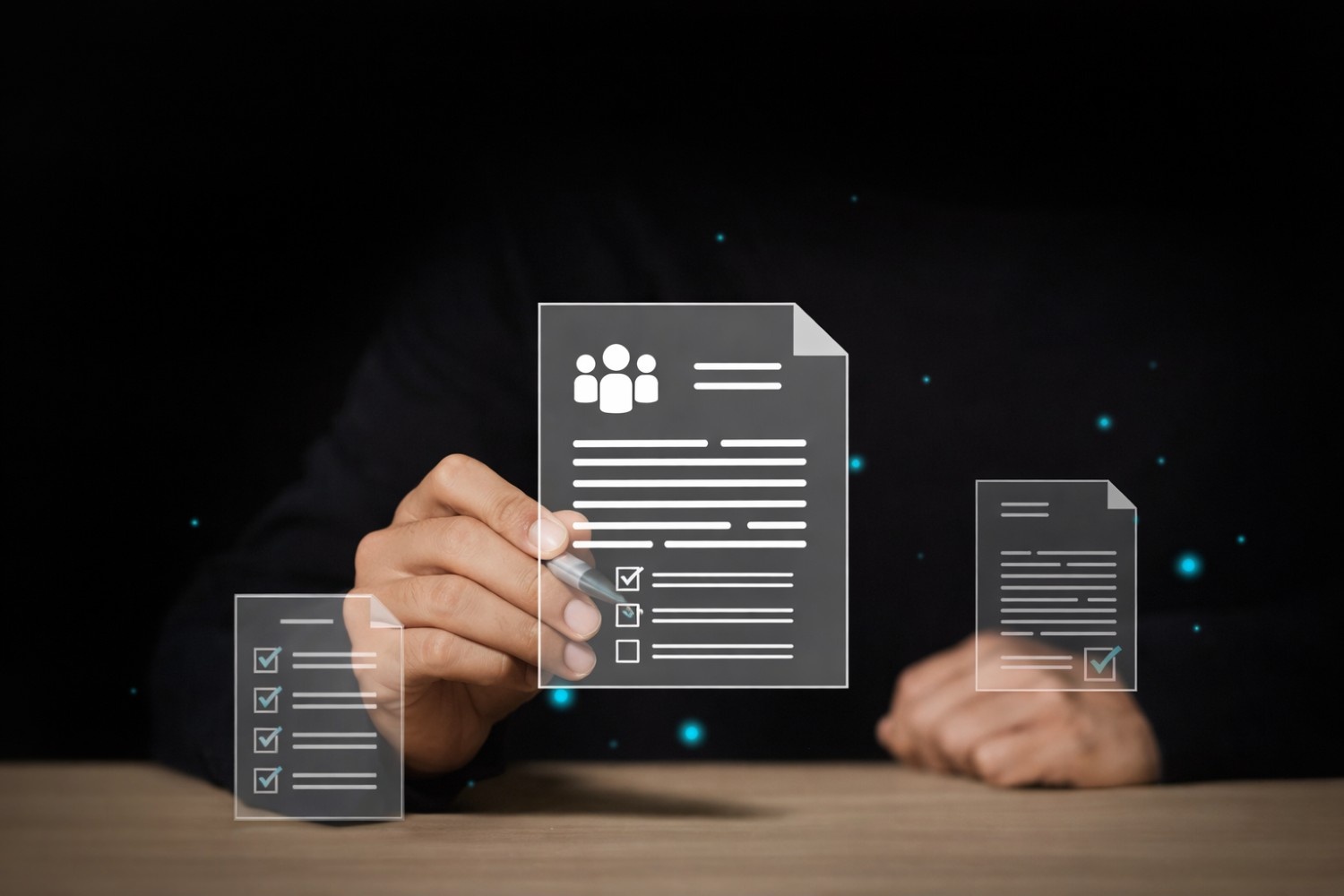7 Key Factors to Consider When Choosing AI Recruitment Software
Choosing the right AI recruitment software is crucial for faster, fairer, and more efficient hiring. Top AI recruiting tools and AI-based recruitment platforms streamline resume screening, automate workflows, reduce bias, ensure security and compliance, and integrate seamlessly with HR systems.

Jyoti Shukla
Senior Sales Manager

Recruitment teams nowadays are under growing pressure to recruit more quickly, improve candidate quality, and at a lower cost. Artificial intelligence (AI) recruiting tools have become one of the most important tools to address these needs, enabling teams to streamline their candidate sourcing process, automate their shortlists, and improve multi-team collaboration.
However, selecting an AI-based recruitment platform is not so easy. Good ROI can only be achieved when organizations perform a thorough assessment of the software prior to its implementation. The review should not merely focus on the surface-level features, but alignment with long-term hiring goals. Here are the 7 most important factors to consider when selecting AI recruitment software.
7 Things to Consider in an AI Recruitment Software
1. Ease of Use and Adoption
Complexity is one of the largest obstacles to using AI in the framework of recruitment. SHRM also suggests that HR tech adoptions usually fail because the software or system is not intuitively designed. Unless your AI system is simple to use, the adoption process will remain stagnant, regardless of whether the technology is good or not.
An effective AI-based recruitment platform must fit the workflow and can be implemented with little training. The main parameters that can be analyzed in terms of the user experience are:
- Time-to-first-action: How quickly can a recruiter post a job, schedule an interview, or shortlist?
- Cross-role usability: Can hiring managers, TA leads, and CHROs each use it without complexity?
- Device flexibility: Is mobile access functional (not just read-only)?
Talentpool has an award-winning, easy-to-navigate UI, role-based dashboards, OTP-based login for hiring managers, and in-platform feedback submission to reduce complexity. Our AI recruitment software is recognized as one of the best-designed projects by IBDA in 2025. Besides, our support team is also available at any time to help recruiters adopt it within days, not weeks.
2. Bias Mitigation and Fairness
According to the 2025 Recruitment Trends Report, diversity, inclusive hiring, and reducing bias are major priorities for talent professionals and organizations, especially amidst the increasing AI adoption.
AI isn’t inherently neutral. If algorithms are trained on biased historical data, they will repeat and reinforce those patterns. New York City has already mandated transparency in AI-based hiring tools (NYC Local Law 144), and more regions are following it.
When evaluating AI recruitment software, look out for:
- Model transparency: Does the system show how decisions are made?
- Adjustable scoring: Can recruiters recalibrate the importance between skill sets, education, and experience?
- Override mechanisms: Are humans always in control of the final shortlist?
3. Automation Depth and Workflow Impact
The real value of AI lies in how deeply it is incorporated into your day-to-day workflows. Don’t just ask “Does it use AI?”. Instead, ask how AI improves daily tasks.
At a minimum, your AI recruitment software has a measurable impact across:
- Resume ingestion: Does the parser structure profiles for direct comparison?
- JD generation: Can it help you create job descriptions in a click based on requisitions?
- Rediscovery: Does it automatically match previous, relevant applicants for new roles?
- AI summaries: Does it cut resume reading time by >50%?
4. Security, Compliance, and Data Privacy
Security and compliance are among the top recruitment challenges for companies looking for AI solutions. According to a Deloitte 2024 report, only 25% organizations feel fully ready to manage AI governance and risks.
While selecting AI recruitment software, the key questions recruiters should ask vendors are:
- Where is the data stored, and is it encrypted in transit and at rest?
- Can we control who accesses which part of the data?
- Are all user actions logged and exportable?
5. Integration and Ecosystem Fit
Disconnected AI recruiting tools create inefficiencies. A good AI-based recruitment platform should reduce, not increase, the number of tabs, exports, and manual syncs your team deals with.
Check whether your recruitment software offers:
- Pre-built connectors: Does it integrate with Naukri, LinkedIn, and your HRMS?
- Interview tools: Can it connect with Google/Outlook calendars or assessment platforms?
- Customization: Can you request specific integration that your organization requires?
6. Ownership Cost and Commercial Clarity
Vendors may offer low base pricing, but mask key features behind add-ons. Cost overruns often happen during scale-ups, when additional users, integrations, or analytics suddenly increase license fees. The real question should not be just "What does it cost now?" but "What will it cost as we scale?".
Check the following:
- License model: Is it by user, by job post, or by module?
- AI feature access: Are parsing, recommendations, and reports bundled or billed separately?
- Support, implementation, and training: Are these one-time or recurring costs?
7. Market Reputation and User Sentiment
Beyond demos, the best way to evaluate a platform is through third-party validation.
Check its reputation through:
- Independent review platforms: Refer to verified customer reviews on G2, Capterra, and Gartner Peer Insights.
- Go-live benchmarks: How long does it take teams of similar size and complexity to complete the implementation?
- Customer profile validation: Are there industry peers or organizations of similar scale already using the platform?
- Published case studies: Are the results tied to meaningful KPIs like time-to-hire reduction, sourcing efficiency, or recruiter productivity gains?
Which Recruiting Software is Best?
The Best AI recruiting software is that which really makes the life of a recruiter easier and can scale along with the growth of an organization without creating issues. That is exactly what Talentpool Recruitment Software is designed to do.
Talentpool's AI-based recruitment platform addresses all key areas recruiters look at when they choose their tool:
1. User-friendly and Easy to Use: Talentpool has a clean interface and a role-based module that eases the workflow of recruiters, hiring managers, and HR managers. It is easy to adapt with OTP-based login, intuitive design, and 360-degree visibility.
2. Automated Resume Screening and Primary Evaluation: Our AI resume screening software automates resume parsing and simplifies the creation of job descriptions with OpenAI. With AI recommendations and AI summary, recruiters and hiring managers can quickly shortlist the most suitable profiles.
4. Enterprise-Level Security and Compliance: SOC 2 Type II certification, GDPR compliance, encrypted storage, SSO integration, and audit logs make Talentpool an enterprise-level secure solution for large-scale recruitment activities.
5. Integrates with Your Existing Recruiting Tools: Talentpool has integrations with LinkedIn, Naukri, HRMS systems, calendars, and assessment platforms. It also enables custom integrations to offer you a totally integrated recruitment environment.
6. Clear Pricing with No Surprises: Talentpool has no hidden costs, clear pricing, industry-leading AI and defined SLAs. Recruitment teams may plan budgeting confidently and incorporate all enhanced AI capabilities
See how Talentpool can transform your recruitment workflow. Schedule a demo today and experience firsthand how AI-powered automation can make hiring faster, fairer, and more efficient.
Final Thoughts
The selection of AI talent acquisition software is not only about checking the list of features but also about assessing the financial value and overall result, factoring in the long-term usage and flexibility. Whether it is the depth of automation or the level of compliance, everything counts within the context of hiring at scale.
Talentpool is constructed not only to automate, but to operationalize the recruitment process. It provides a viable and tested option for the TA teams that take efficiency, fairness, and long-term scalability seriously. It’s not just AI for the sake of AI, it’s AI that works.
If you are considering an AI-based recruiting tool, apply the following seven factors stringently. It is the distinction between a simple AI recruiting tool and an all-in-one AI recruiting software that reshapes the hiring process.
Tags

Jyoti Shukla
Senior Sales Manager
Jyoti Shukla is a key member of the Talentpool team, bringing extensive experience in talent acquisition and recruitment technology to help companies build better hiring processes.




